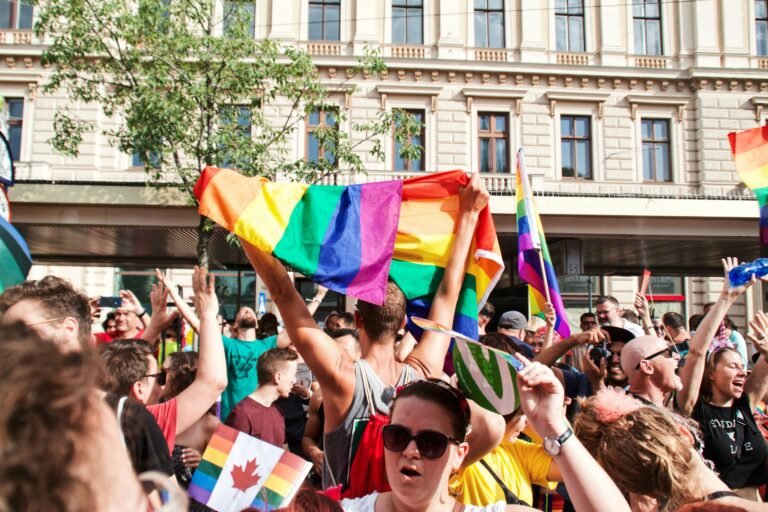Photo by Hannah Voggenhuber on Unsplash
Addiction is a disease that can affect any person, no matter their gender or ethnicity. However, this condition is more challenging for the LGBTQ+ community. Studies are showing that the substance misuse rate in the LGBTQ+ community is higher compared to others. Discrimination, marginalization, internalized stigma, etc., contribute to this. Let’s look at some unique addiction challenges to understand the struggles of this community.
The Stigma of Double Marginalization
One of the most significant barriers to recovery for the LGBTQ+ community is the stigma associated with both their sexual orientation or gender identity and their addiction. Such double marginalization can result in shame, alienation, and discrimination, complicating help-seeking behavior. That’s especially true in cases of LGBTQ+ drug addiction, where individuals struggle to find empathetic support. Apart from this, a number of LGBTQ+ people may have had traumatic or discriminatory experiences in the past, which can increase their vulnerability to substance abuse.
Fear of Judgment and Rejection
The fear of being judged or rejected by family, friends, or the LGBTQ+ community can also deter individuals from seeking treatment. Many people worry that coming out as both LGBTQ+ and addicted will lead to further marginalization or rejection. Fear of being isolated and judged makes it difficult to build a support network and access the resources needed to overcome addiction.
Lack of LGBTQ+ Inclusive Treatment Programs
Another challenge LGBTQ+ individuals deal with is the unavailability of treatment programs that consider their unique needs. Most of the conventional treatment programs are not tailored to the specific issues this community encounters, like the problems of homophobia, transphobia, and internalized stigma. The unavailability of these personalized programs makes it difficult for individuals to feel comfortable and encouraged in a therapeutic environment.
Finding a Supportive Community
Building a supportive community is of utmost importance in the process of recovering from any form of addiction. It can be more difficult for LGBTQ+ individuals who have faced rejection or discrimination in the past. Catering to the LGBTQ+ society’s needs, there are plenty of support groups that can offer a safe and friendly space to members.
Additional Considerations
Beyond the challenges mentioned above, LGBTQ+ individuals in recovery can also face specific issues related to their sexual orientation or gender identity. For example, LGBTQ+ people can be more likely to engage in risky behaviors, such as unprotected sex or substance abuse, as a way of coping with discrimination or internalized stigma. Dysphoria or body image issues are also faced by some individuals, which can be exacerbated by addiction.
It is important to address these particular needs in a caring and thoughtful manner. Therapists and treatment programs should be trained to provide culturally competent care that is sensitive to the specific issues faced by LGBTQ+ individuals. Support organizations can allow members to share their personal struggles with others who understand them, promoting a feeling of community.
Self-Acceptance and Affirmation
Self-acceptance and affirmation are some of the key steps towards recovery. For LGBTQ+ individuals, this can include coming out to yourself and subsequently to others, a process of acceptance that allows you to feel at ease and become who you truly are. This process can take time and is difficult, yet it is essential for building a strong foundation for recovery.
Seeking Professional Help
Looking for professional assistance plays a significant role in addressing the problem of addiction. There are numerous effective methods, including therapy, medication-assisted treatment, and support networks in overcoming addiction. Finding an expert therapist or a treatment program that is LGBTQ+ inclusive and understands the unique challenges faced by the community is very important for a successful recovery.
Hope for the Future
Even with these challenges, addiction recovery is possible for LGBTQ+ individuals. You can learn to cope with the hurdles and, ultimately, overcome the addiction and maintain sobriety through support and self-acceptance. And above all, the feeling of isolation and helplessness should not cross your mind. There are people who care about you and would like to see you succeed. Reach out to them if you ever feel like it.
Closing Thoughts
The recovery journey can be turbulent for LGBTQ+ individuals, but it’s possible. It’s all about being hopeful. Asking for help, building a healthy environment, and accepting yourself are all constructive ways to overcome the hurdles and achieve lasting recovery.

Daniel J. Morgan is the founder of Invidiata Magazine, a premier publication showcasing luxury living, arts, and culture. With a passion for excellence, Daniel has established the magazine as a beacon of sophistication and refinement, captivating discerning audiences worldwide.





